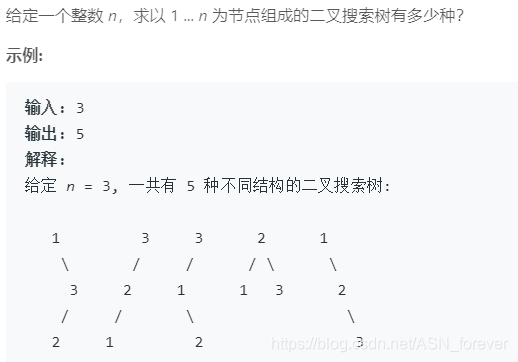
思路:
一般来说,只要涉及到二叉树或二叉搜索树的,基本都要用到根结点和递归的思想。对于本题来说,假设要求的结果为f(n),那么开始分析:由1到n节点组成的二叉搜索树的根结点总共有n种取值情况,即1,2...n分别作为根结点,当1作为根结点时,其左子树为空记为f(0),右子树为2到n总共n-1个节点组成的二叉搜索树,且这n-1个节点总共有f(n-1)种组成情况,因此,以1为根结点时,总共有f(0)*f(n-1)种不同的二叉搜索树(令f(0)=1);同理,以2为根结点时,左子树只有1这一个节点,所以f(1)=1,总共有f(1)*f(n-2)种组成情况。。。,很明显是递归的过程。最终的结果表达式为:f(n) = f(0)*f(n-1)+f(1)*f(n-2)+...+f(n-1)*f(0)。
解法一:递归
public int numTrees(int n) {
if(n <= 1)
return 1;
int res = 0;
for(int i=0;i<n;i++){
res += numTrees(i)*numTrees(n-1-i);
}
return res;
}递归不出意料的出现了超时问题,因为有重复计算,因此想到用map保存已知的结果f(i)来优化算法,即动态规划的思想。
解法二:map实现动态规划
static Map<Integer,Integer> map = new HashMap<>();
public int numTrees(int n) {
if(n <= 1){
return 1;
}
int res = 0;
if(map.containsKey(n)){
return map.get(n);
}else{
for(int i=0;i<n;i++){
res += numTrees(i)*numTrees(n-1-i);
}
map.put(n,res);
}
return res;
}下面是n=20时,两种算法耗时对比:

但是在LeetCode中大概耗时3ms,只能击败7%的提交。
LeetCode上还有一种使用数组实现的动态规划的解法,只需要0ms,没太理解,这里只贴出代码。
public int numTrees(int n) {
int[] G = new int[n + 1];
G[0] = 1;
G[1] = 1;
for (int i = 2; i <= n; ++i) {
for (int j = 1; j <= i; ++j) {
G[i] += G[j - 1] * G[i - j];
}
}
return G[n];
}解法三:卡特兰数数列
卡特兰数是组合数学中一个常出现在各种计数问题中的数列。其满足如下条件:f(0) = 1,f(1) = 1,f(n) = f(0)*f(n-1)+f(1)*f(n-2)+...+f(n-1)*f(0)。通过分析可知,此题就是一个卡特兰数列求第n项的问题。而卡特兰数列的另一个递推公式为:f(n)=f(n-1)*(4*n-2)/(n+1),因此可以直接根据递推公式迭代求解。
public int numTrees(int n) {
long res = 1;
for (int i = 1; i <= n; i++) {
res = res * (4 * i - 2) / (i + 1);
}
return (int) res;
}








 本文探讨了如何计算由1到n个节点组成的二叉搜索树的不同形态数量,提出了三种解法:递归、动态规划(包括map和数组实现)及直接应用卡特兰数的递推公式。
本文探讨了如何计算由1到n个节点组成的二叉搜索树的不同形态数量,提出了三种解法:递归、动态规划(包括map和数组实现)及直接应用卡特兰数的递推公式。
















 651
651

 被折叠的 条评论
为什么被折叠?
被折叠的 条评论
为什么被折叠?








